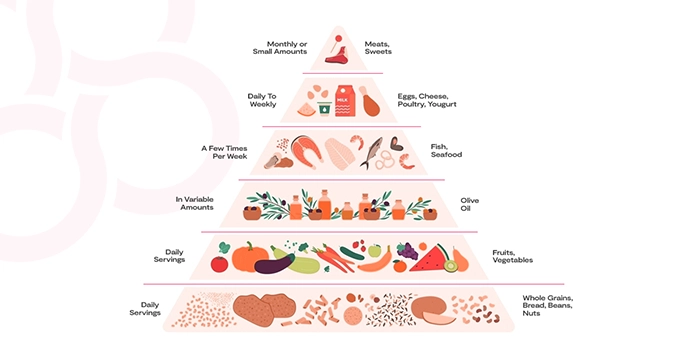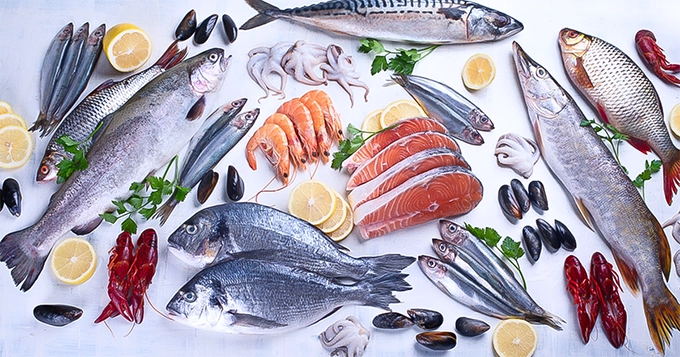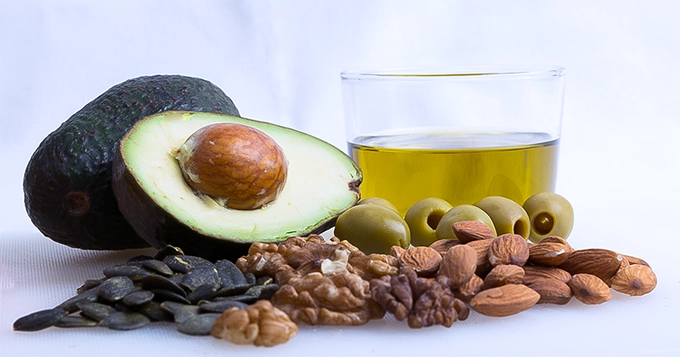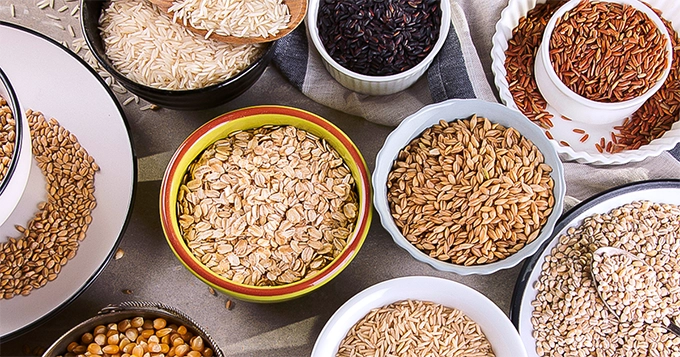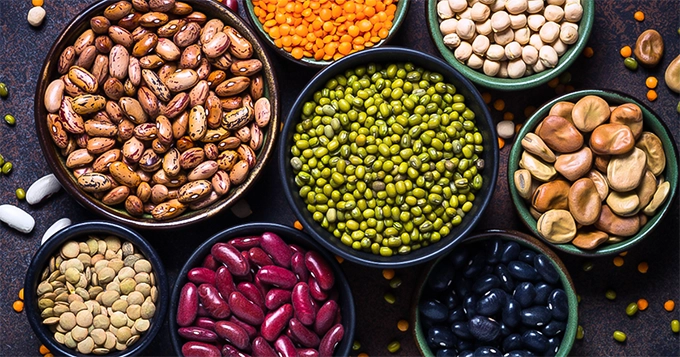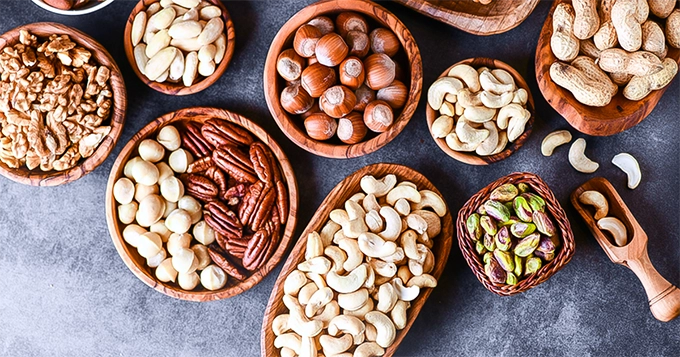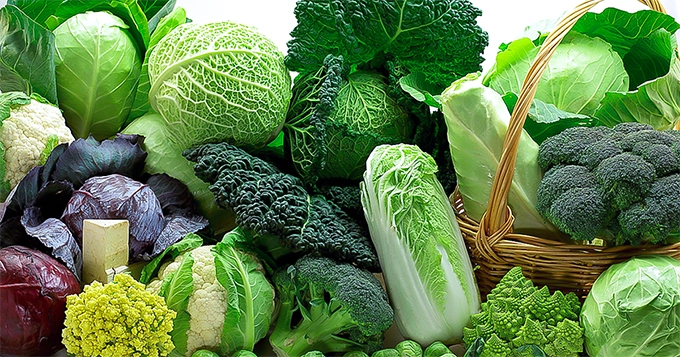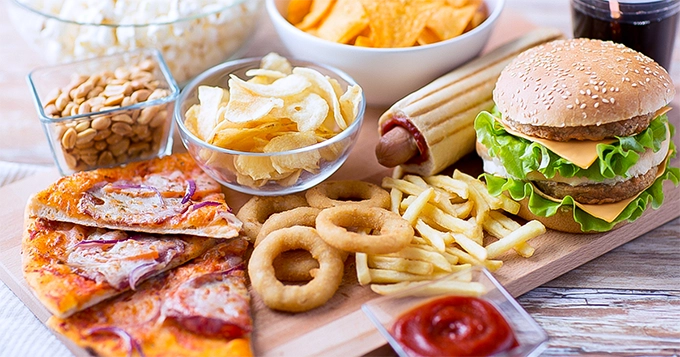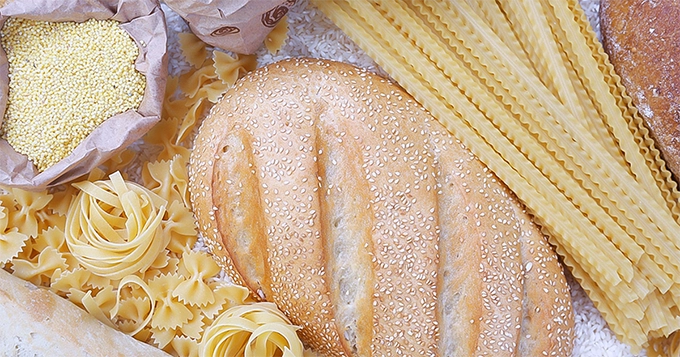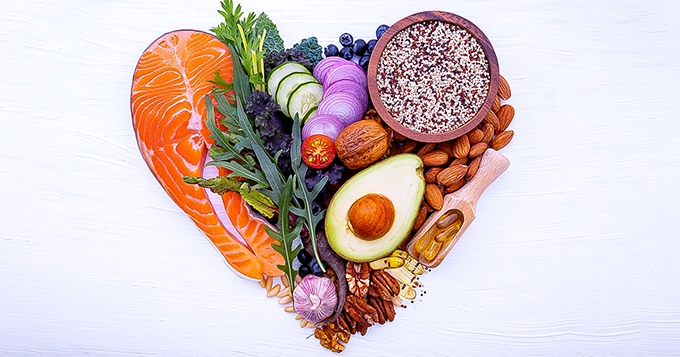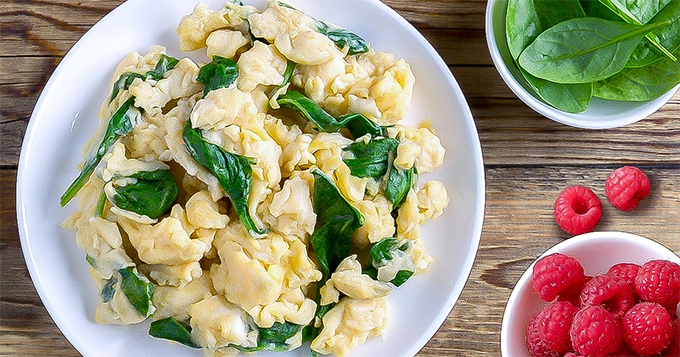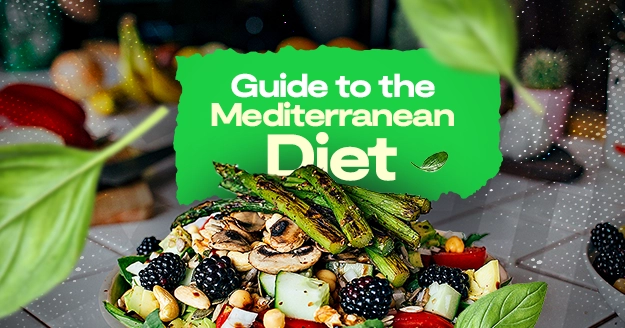What is the Mediterranean Diet?
This diet has no strict rules or regulations, but it typically promotes whole grains, nuts, seeds, legumes, fruits, vegetables, and heart-healthy fats. Foods such as poultry, eggs, and dairy products must be eaten in moderation, and red meats are limited. Sugary, processed foods, and refined grains should be restricted.
The Mediterranean diet encourages eating various nutrient-rich foods while limiting sugars and processed foods high in calories. Though the diet was adapted to reduce the risk of heart disease, numerous studies show that its plant-based, high unsaturated fat dietary pattern can also help with weight loss.
Recommended Mediterranean Food
Poultry:
- Chicken
- Turkey
- Duck
- Emu
- Goose
- Bush birds
Dairy:
- Brie
- Ricotta
- Greek yogurt
- Pecorino
- Feta
- Corvo
Fish and seafood:
- Crab
- Shrimp
- Mussel
- Tuna
- Sardine
- Salmon
Healthy fats:
- Fish oil
- Olive oil
- Olives
- Avocado oil
- Flaxseed
Whole grains:
- Buckwheat
- Oats
- Brown rice
- Rye
- Barley
- Millet
Legumes:
- Black beans
- Soybeans
- Kidney beans
- Lima beans
- Chickpeas
- Lentils
Nuts, seeds, and nut butter:
- Hazelnut
- Almond
- Cashew
- Walnut
- Almond butter
- Peanut butter
Vegetables:
- Cucumber
- Broccoli
- Tomato
- Cabbage
- Cauliflower
- Pumpkin
Fruits:
- Apple
- Banana
- Orange
- Avocado
- Blueberry
- Pineapple
What foods should be limited to a Mediterranean diet?
Sugary foods:
- Soft drinks
- Icecream
- Syrup
- Cookie
- Table sugar
Processed foods:
- Hot dog
- Fast food
- Microwave popcorn
- Beef jerky
- Granola bar
Refined grains:
- White rice
- White bread
- White flour
- Corn grits
- Regular white pasta
Refined oils:
- Canola oil
- Soybean oil
Benefits of the Mediterranean diet
Reduces risk of heart diseases. Over time, those who followed closely to a Mediterranean diet had a 24% lower chance of developing heart disease and a 23% decreased risk of dying.
Reduces risk of cognitive decline and Alzheimer’s disease. Even among those with higher hereditary risk, a diet high in vegetables, nuts, healthy grains, and seafood lowered the risk of developing dementia by nearly four percent.
Helps with weight loss. The diet can aid your healthy weight loss goals when combined with caloric restriction.
Staves off Type II Diabetes. Evidence shows that the Mediterranean diet improves blood glucose management in people with type two diabetes.
Helps with rheumatoid arthritis. Suggested foods for this diet (such as omega-3 fatty acids) usually include anti-inflammatory properties, which help with the swelling and pain in and around the joints.
Eases depression. Compared to people who followed a pro-inflammatory diet (a diet rich in sugary, processed foods, fast foods, and trans fats), the diet was related to a 33% lower risk of depression.
How to follow the Mediterranean diet?
- Swap fast and processed foods with home-cooked meals.
- Eat more grains, legumes, fruits, and veggies.
- Rely on healthy fats (one way is by swapping your butter with olive oil when you cook)
- Try to avoid fatty red meats.
- Eat some dairy and eggs.
- Drink more water instead of alcoholic drinks or processed fruit juices.
If you need help with thinking about what to eat, here are some Mediterranean diet recipes and meal ideas:
Spinach & Egg Scramble with Raspberries
Servings: 1
Calories per serving: 306
Carbs per serving: 23 g
Fats per serving: 16 g
Protein per serving: 19 g
Ingredients:
1 teaspoon olive oil
1 ½ cups baby spinach
2 large eggs (lightly beaten)
Pinch of kosher salt
Pinch of ground black pepper
1 slice of toasted whole-grain bread
½ cup fresh raspberries
Procedure:
Step 1: Preheat.
Set your stove to medium-high heat. Put your small nonstick skillet on top and put 1 teaspoon of olive oil.
Step 2. Spinach.
Cook your spinach for 1 to 2 minutes or until wilted. Remember to stir often. Once done, you can move the spinach to a separate plate.
Step 3: Eggs.
Wipe the pan and set the stove to medium heat and add eggs. When cooking, stir for 1-2 minutes to ensure even cooking. Add in the salt, pepper, and spinach, then stir.
Step 4. Serve.
Along with bread and raspberries, serve the scrambled eggs.
Avocado-Egg Toast
Serving: 1
Calories per serving: 150
Carbs per serving: 17g
Fats per serving: 13 g
Protein per serving: 9 g
Ingredients:
¼ avocado
¼ teaspoon ground black pepper
⅛ teaspoon garlic powder
1 slice whole-wheat bread, toasted
1 large egg, fried
1 teaspoon Sriracha (Optional)
Procedure:
Step 1. Mix.
In a small bowl, combine the avocado, garlic powder, and pepper. Gently mash.
Step 2. Enjoy.
Add the avocado mixture and fried egg to the toast. You can top it with Sriracha as garnish. Enjoy your meal.
Conclusion
The Mediterranean diet is a happy way of eating that emphasizes flavor and the joy of the table while celebrating wonderful and fulfilling meals.
It is indeed a great diet packed with many benefits, but if you want to benefit from it fully, it’s still vital to monitor your portions, avoid junk foods, and create a Mediterranean diet meal plan tailored to your needs and goals.
